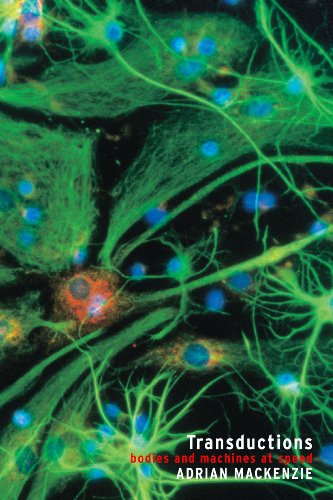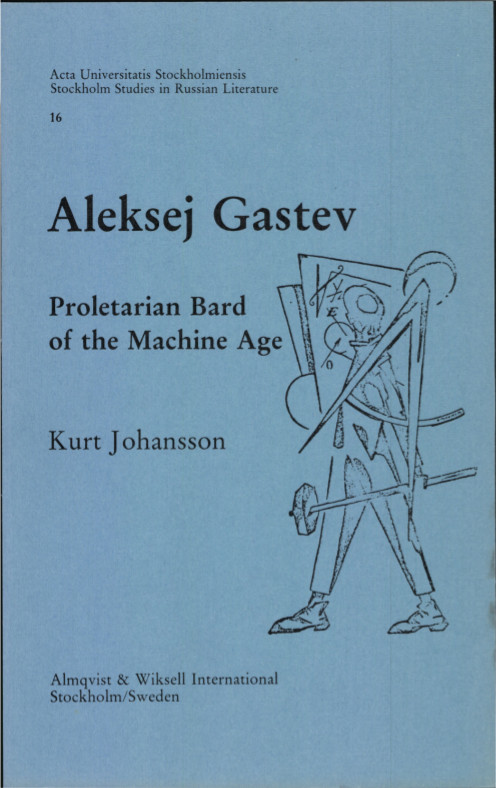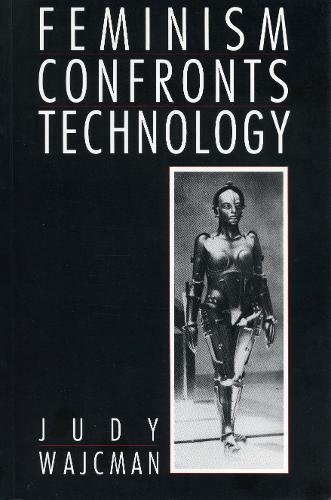Adrian Mackenzie: Transductions: Bodies and Machines at Speed (2002)
Filed under book | Tags: · biotechnology, body, machine, speed, technology, time, transduction

“What do the patented data structures embedded deep in the code of an online computer game or the massively complicated architecture of the latest supercomputer used to simulate nuclear explosions have to do with culture, life or meaning? Why does technology attract such wildly differing responses – from fervour to boredom to distrust?
Transductions explores these questions by drawing on science and technology studies, contemporary critical theory and corporeal theory. An exploration of complex technologies such as online computer games, genomic databases and the global positioning system reveals how the borders between bodies and machines, between what counts as social and what counts as technical, are no less diverse and complicated than culture itself. Indeed, they constitute a crucial dimension of contemporary culture. Through a critical analysis of the widely accepted notion that technology speeds everything up, Transductions argues that there are only ever differences in speed. The question for us now is how can such differences be represented?”
Publisher Continuum, London and New York, 2002
Technologies: Studies in Culture & Theory series
ISBN 082645884X
231 pages
Reviews: Matthew Fuller (Convergence, 2003), Kim Toffoletti (Culture Machine).
PDF (9 MB, updated on 2019-11-20)
See also Fibreculture Journal’s issue on “Trans” (2011) co-edited by Mackenzie.
Comment (0)Kurt Johansson: Aleksej Gastev: Proletarian Bard of the Machine Age (1983)
Filed under book | Tags: · 1910s, biography, machine, management, poetry, proletariat, russia, taylorism

This book attempts to give an outline of Aleksej Gastev’s life and works primarily up until 1920.
Aleksej Gastev (1882-1941?) belonged to the Russian proletarian intelligentsia. He was an active revolutionary, a journalist with syndicalist leanings, a metal-worker and trade-union leader, and one of the best proletarian poets. In later years he became perhaps the most important champion of the Taylor system and scientific management in Russia; as the founder and leader of the Institute of Labour (CIT) in Moscow he trained hundreds of thousands of new workers for Soviet industry. In 1938 he fell a victim to the Stalinist terror.
Besides presenting his biography, the present study tries to trace the development of Gastev’s Utopian ideas about the creation of a New Man suited to the industrial society of the future. In his articles and poems the worker is so Intimately fused with machines that he adopts their rhythm and functional movements, himself becoming “mechanical”. One chapter is specially devoted to Gastev’s poetry, the collection Poézija rabočego udara (“The Poetry of the Factory Floor”). Four prose poems are analyzed in detail. These describe the future development of the proletariat, and also show how Gastev ‘s manner of writing gradually becomes a kind of “Taylorized” poetry, that has been strongly influenced by futurism.
Publisher Almqvist & Wiksell International, Stockholm, 1983
Stockholm Studies in Russian Literature series
ISBN 9122006141
170 pages
PDF (updated on 2013-12-8)
Comment (0)Judy Wajcman: Feminism Confronts Technology (1991)
Filed under book | Tags: · feminism, gender, machine, technology, women

“Feminism Confronts Technology provides a lively and engaging exploration of the impact of technology on women’s lives from word processors to food processors, and genetic engineering to the design of cities. Comprehensive and critical, this book surveys the sociological and feminist literature on technology, highlighting the male bias in the way technology is defined as well as developed. Wajcman sets the scene with an overview of feminist theories of science and technology: encompassing the technologies of production and reproduction as well as domestic technology.
The author challenges the common assumption that technology is gender neutral, looking at whether technology can liberate women or whether the new technologies are reinforcing sexual divisions in society.”
Publisher Pennsylvania State University Press, 1991
ISBN 0271008024, 9780271008028
x+184 pages
Reviews: Ann Dugdale (Social Studies of Science), Linda Layne (Science, Technology, & Human Values), Raelene Frances (Journal of Industrial Relations), Antony Marsh (Prometheus).
PDF (26 MB, updated on 2019-10-10)
See also Wajcman’s TechnoFeminism, 2004.
Comments (2)
